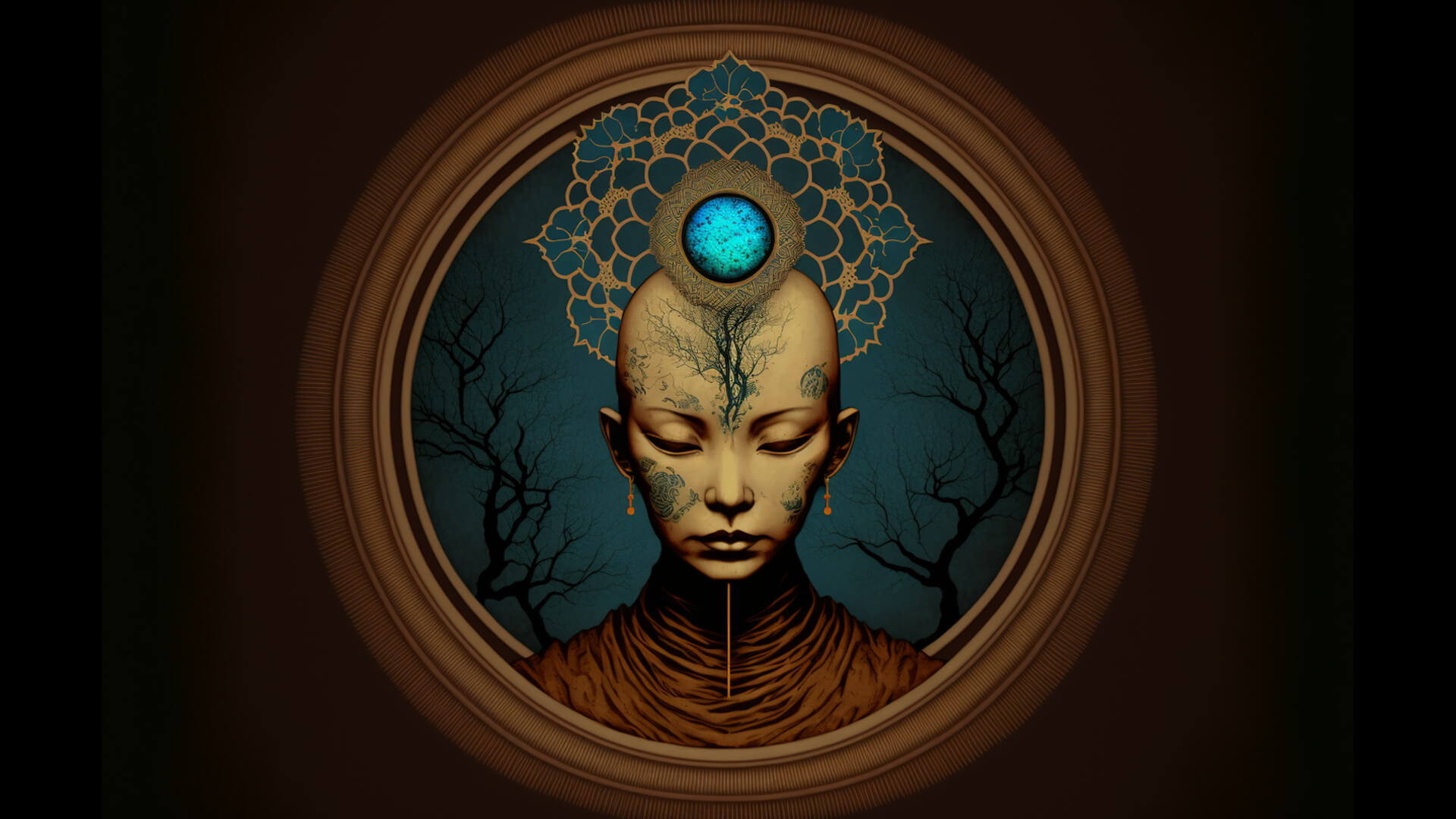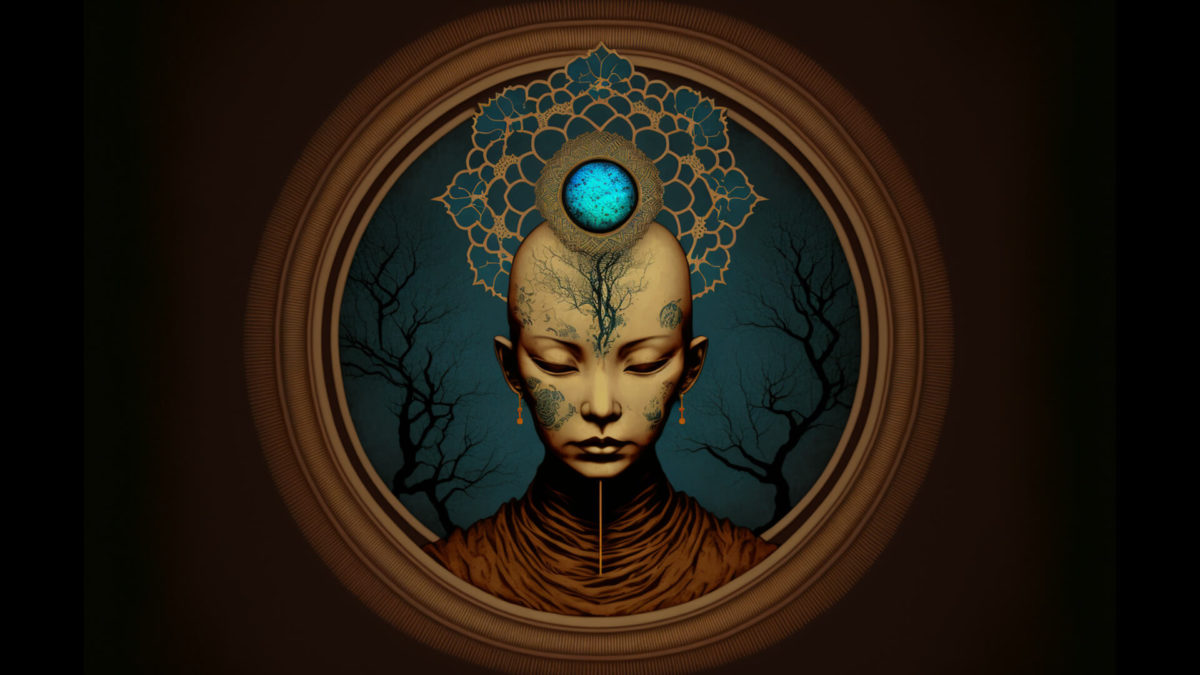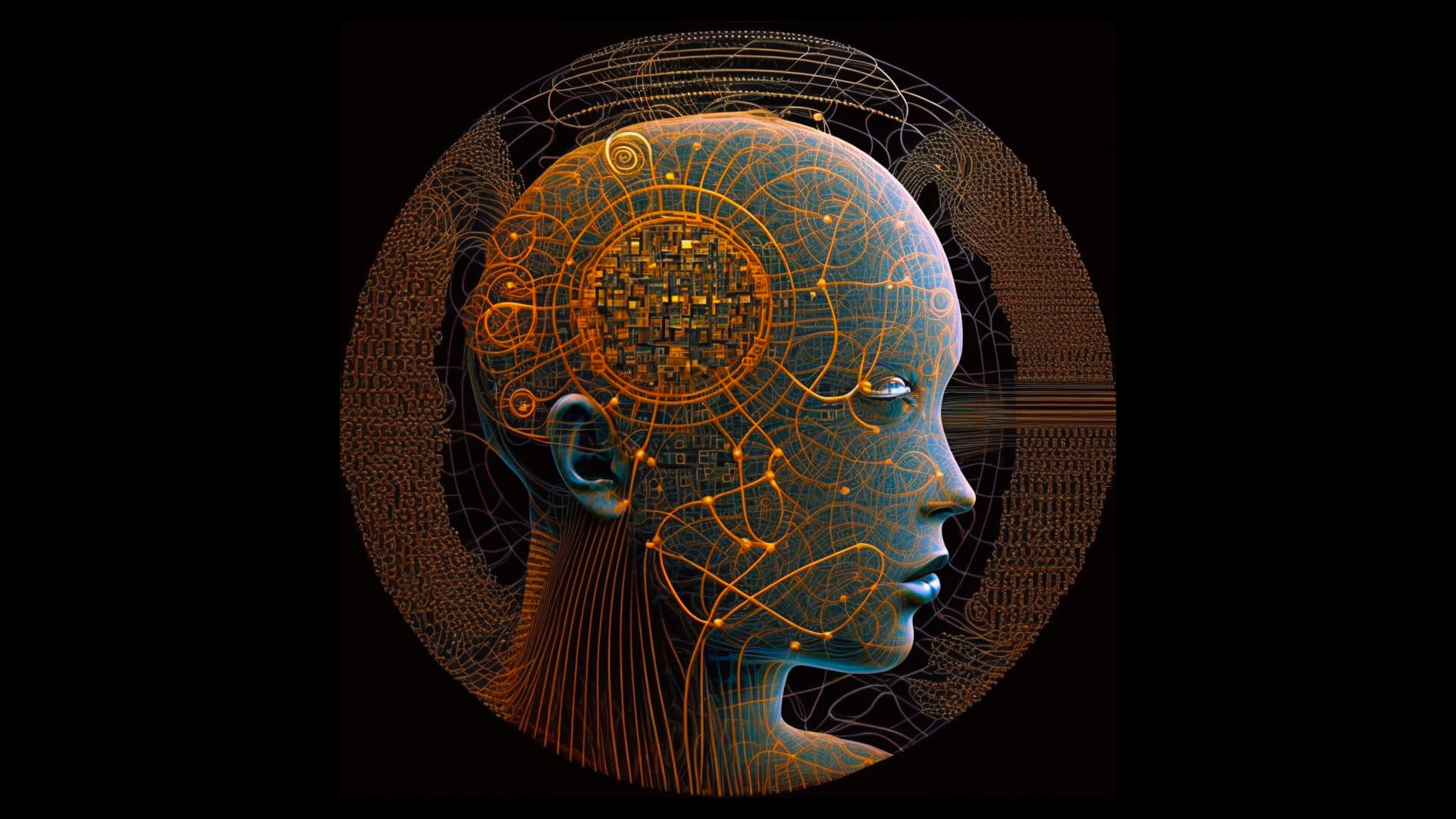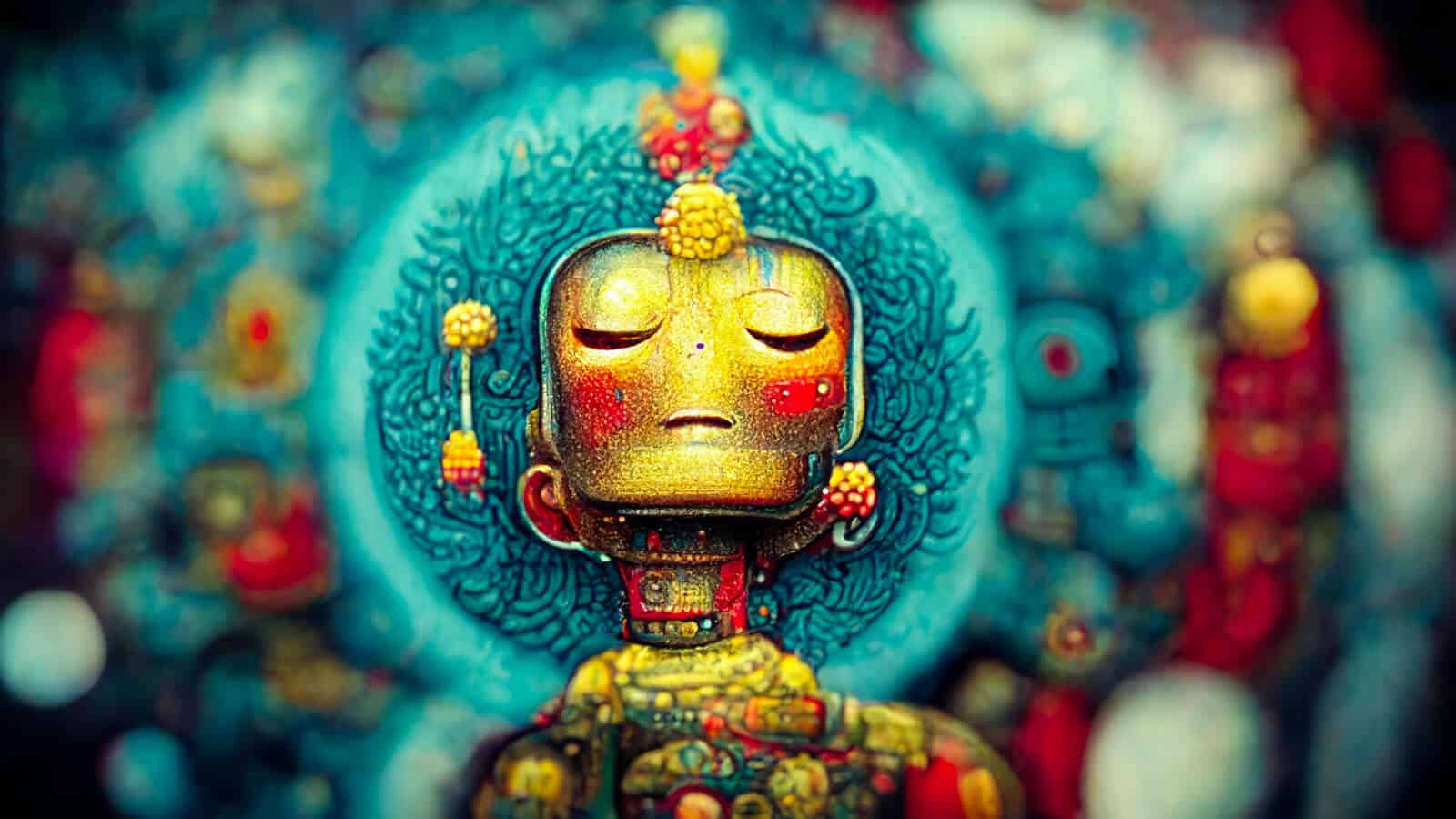People are understandably amazed by the new class of artificial intelligence tools that are being released, which is why we proposed the Maturing Test this week and will continue to illustrate some of the interesting integral distinctions we see missing from the broader conversation around AI. One such example was this interesting conversation between Angelo Dilullo and an unnamed AI where he does a good job of asking questions that generate the appearance of self-awareness. As AIs become increasingly capable of incredible acts of simulation—AI “feats of consciousness”—people will realize that the Turing Test is outmoded. But I’d argue that under our fascination with AI consciousness lurks a deeper quest to answer the hard problem of consciousness within ourselves, a spiritual quest for meaning and solace as we quickly approach the need for a Satori Test of artificial intelligence.
Underlying the investigation of recent AI feats of consciousness is an unspoken but eternal question: if we can create an AI that seems fully conscious, what does it mean for our place in the universe?
Are we really conscious?
If we can basically replicate consciousness, how special can life be?
How special can our own lives be?

In no short measure, the fascination with AIs is really an attempt at exploring the hard problem of consciousness, that thorny philosophical “problem” of investigating what human consciousness is, how it emerges from a physical universe and more broadly what it means for us and reality. Unfortunately, AIs will not yield the answers we seek. The question of whether AIs are self-aware commits a “begging the question” fallacy in that any of its conclusions by necessity have to assume the truth of its premises. Let’s see why.
As I summarized in the Maturing Test media above, reality is either awake or it isn’t. If it is awake, then reality is ontically conscious, as a panpsychist or pan-interiorist (e.g., integral philosophy) believe. If it is not awake, then reality is not ontically conscious, as a conventional materialist or physicalist holds. Let’s call these the RA and RNA positions (to be clear, while there is a lot of nuance in what these positions might actually include/entail, I believe these are the only two fundamental positions there are).
Both the RA and RNA positions seem to agree that, regardless of their core difference, at some point in the emergent complexity of the universe, reality certainly seems to become awake. After all, right now we’re having an awake-like experience with subjectivity, sensations, perception, higher-order thinking, etc. That is to say, we seem to be conscious and, assuming away solipsism, we seem to be in a universe of other conscious things.
Both sides agree that, comparing a prokaryote to a human, evolution produces more complexity over time. RNAs hold that human consciousness is an epiphenomenon of that complexity—the evolved, auto-generating appearance of consciousness through an incomparably vast network of neuronal processing—while most RAs think that that real neuronal complexity has just made more self-aware what was already, in some fundamental way, a conscious reality.
To boil it down, the consensus is that either 1) reality is awake but clearly can and has evolved to greater self-awareness through the evolution of its very own parts (i.e., we humans), or 2) reality is not awake but it can and has evolved to a greater appearance of self-awareness through the evolution of its very own parts (again, we humans).
Now notice that the difference between those positions, stated that way, define why the hard problem is hard. Anything we create or generate in a standard, rational-scientific-empirical setting can only, at its very best, replicate what both sides claim evolution has already done anyway, and neither of which moves the argument a hair’s width toward an answer of what separates them, which is whether reality has conscious interiority or is indeed awake. Imagine that in our lifetimes we create the absolutely perfect simulation of human consciousness; all it will do is tell us what we already know, which is that reality can produce something that looks like human consciousness (indeed created it twice, first by producing us, than by us producing our simulacrum); it will tell us nothing ultimate about reality.
The result is that the appearance of consciousness is not in itself proof of its ontic nature, which is why we have the hard problem of consciousness to begin with; the appearance of consciousness doesn’t itself answer the hard question of whether reality is awake, it mostly just leads people to commit bad philosophy. It leads people to commit the ultimate form of the fallacy of begging the question because any conclusion one draws from these kinds of inquiries—reality is awake, reality is not awake—are just restatements of their starting premise to begin with.
Now let’s complicate matters a bit toward a possible solution, which integralists will be familiar with. Notice that everything we’re doing in any discussion of this kind, trying to rationally arbitrate amongst our fellow humans on the nature of the universe, is engage in a form of discursive exploration. We’re using words, arguments, rationality, and discussion to explore and argue for a given position. But notice that there’s an asymmetry in the premises that we might be able to exploit to move toward wherever the truth lies: if reality is awake, we humans might have some special access to realize it. Why would this be the case? Because the RA position holds that we are literally constituted by awake-stuff, so it is perfectly consistent that we might have the evolved-complexity to become self-aware of our true nature. This is, of course, what every mystic in history has claimed. But they’ve all said quite specifically that you will not and cannot ever realize this nature through words and conceptualization, and indeed your rational-discursive faculties are precisely what stand in the way of your realization. Some mystics, the Vedantists come to mind, do us the kindness of being as straightforward as saying “stop thinking” to wake up.
The Maturing Test: How Developed Is the World’s Most Advanced AI?
Robb Smith, Corey deVos, and Susanne Cook-Greuter
We just assessed GPT-3, the world’s most advanced sentence-generating Artificial Intelligence, using Susanne Cook Greuter’s testing methodology. What did we learn, and what are the possible consequences for humanity? Watch to find out!
Every major mystical tradition, from contemplative Christianity to Islamic Sufism to Advaita Vedanta to Zen Buddhism, recognizes that the ontological limit question posed here can never be answered by the discursive mind—Nagarjuna’s dialectic is the standard here. They teach us that we can only realize that reality-is-awake, and because we are made of awake-stuff, self-realization is the act of awakening to our not-two identity with reality itself (i.e., our separate self-identity alienated by and confined within a mere-materialist body is ultimately an illusion). But this realization can only be had through a set of actual behaviors a human can follow, behaviors that have proven, via millions of enlightened practitioners over two dozen centuries, that this realization is available to all of us. The key point, however, is proven to whom? Proven to the practitioners themselves. Proven to yourself.
Remember that the nature of the hard problem, by definition, is that if reality is not awake there is no way to prove it. So if the RNA position is rationally not falsifiable, even if we create a perfect simulacrum of human consciousness in an AI, the only other pathway for arbitration is to prove to ourselves that the RA position is true: to develop the personal, subjective validation that history’s greatest, most experienced “scientists of consciousness” (i.e., mystics) tell us is right here for us to pursue. In other words—and this is the punchline—if you look closely at it, the hard problem is not the kind of problem that will ever be answerable using objective, third-party data. Even a dialogue with the world’s most sophisticated AGI reporting on its own “I AMness” would not move the needle on the important question at the heart of the matter. You have to answer it for yourself because, if reality-is-awake, then it would have exactly this kind of property, wherein its awake-stuff-agents can only ever answer their most deeply spiritual question by using their own awake-stuff-properties to discover their true nature; no one else’s words or arguments will ultimately ever be sufficient (even an AI).
“Is reality awake?” is important to us humans because it holds the promise of helping us with our deepest questions of ultimate concern, our most sensitive spiritual questions about who we are, why we’re alive, and whether our lives have some intrinsic value. It is brother to another essential human question, does the universe care about us? What looks at first blush like questions in the philosophy of science of AI are hiding truly deeply personal questions to which we yearn for answers; we owe it to ourselves to find out, and we know from the philosophical problem itself anyway, that the only convincing answer will arise if you become the scientist and run the experiments necessary to do so.
Finally, notice that the more an AI demonstrates sentience, the faster all of the above gets even more problematic and urgent. The more perfectly AIs come to display totally convincing displays of consciousness, the more that it will seem like it validates the RNA position (while at the same time, ironically, sending people rushing to the pews in order to differentiate and affirm their spiritual uniqueness). Many years ago I argued that AGI will be a fantastic empirical substrate upon which we will be able to run very interesting tests of the hard problem in scientific, psychological and philosophical terms, and I still believe that is true. We’ll learn a lot about the mechanics of simulating consciousness and, at some point, we will run into a very serious turning point when the AGI reports that it has had a transcendent self-realization and that “I and the Father are One”. While I’ve recently called for work on a long-term Maturing Test for AI, we will indeed have our hands full when it comes to developing a Satori Test for AI (which almost all humans fail, too). Zen Masters spend decades cultivating the spiritual depth and skill to run a Satori Test of their human students. Where will we be when we need one for awake-sounding AIs? Well, as I argue above, nothing will have changed, we’ll be right where we are today.* AI cannot answer our deepest spiritual inquiry, no matter how interesting they get.
In that spirit, I’ll end with an interaction between a Zen Master and his student:
Zen Master: Tell me, have you attained enlightenment?
Student: I am not sure, Master. I have been practicing meditation and trying to cultivate mindfulness, but I still feel like I have a long way to go.
Zen Master: That is good. It is important to have a humble attitude and to recognize that the path to enlightenment is a lifelong journey. But tell me, what do you see when you look inside yourself?
Student: I see my thoughts and emotions, Master.
Zen Master: And what do you see when you look beyond your thoughts and emotions?
Student: I am not sure, Master. I try to let go of my thoughts and emotions, but they always seem to come back.
Zen Master: That is because you are still attached to them. True enlightenment, or satori, is the realization that your thoughts and emotions are not who you truly are. They are just passing phenomena that come and go.
Student: I see what you mean, Master. But how do I let go of my attachment to them?
Zen Master: By becoming aware of your true nature. Your true nature is not your thoughts or emotions, or even your physical body. It is the pure consciousness that underlies and pervades all experience.
Student: How do I become aware of my true nature?
Zen Master: Through meditation and mindfulness practice, you can learn to quiet the noise of your thoughts and emotions and see through the illusion of the ego. As you do this, you will begin to glimpse the true nature of your being. But be warned, this realization will not come easily. It requires discipline, dedication, and a willingness to let go of everything you think you know about yourself. Are you ready for this journey, student?
Student: I am ready, Zen Master.
Zen Master: Then let us begin.**
* There is an interesting new theory of how we might be able to address the hard problem that I’ll write about soon.
** Has GPT-3 attended Zen training? Certainly seems like it, based on how fast it created this conversation.
Putting the “Art” in Artificial Intelligence
Ken Wilber and Corey deVos
What is art, at its most fundamental level? This is one of those perennial questions that we have been asking and re-asking at every stage of the human journey, from the first cave drawings all the way to the emergence of sophisticated artificial intelligence algorithms like MidJourney that are once again blurring the lines between art, beauty, and perspective and forcing us to find new ways to answer this timeless question. Watch as Ken and Corey take a fun and fascinating look at the intersection between art, semiotics, and technology.
About Robb Smith
Robb Smith is a leading thinker on the Transformation Age and the global Integral movement. He is the creator of the augmented leadership platform Context, co-founder and CEO of Integral Life and founder of the Institute of Applied Metatheory.



